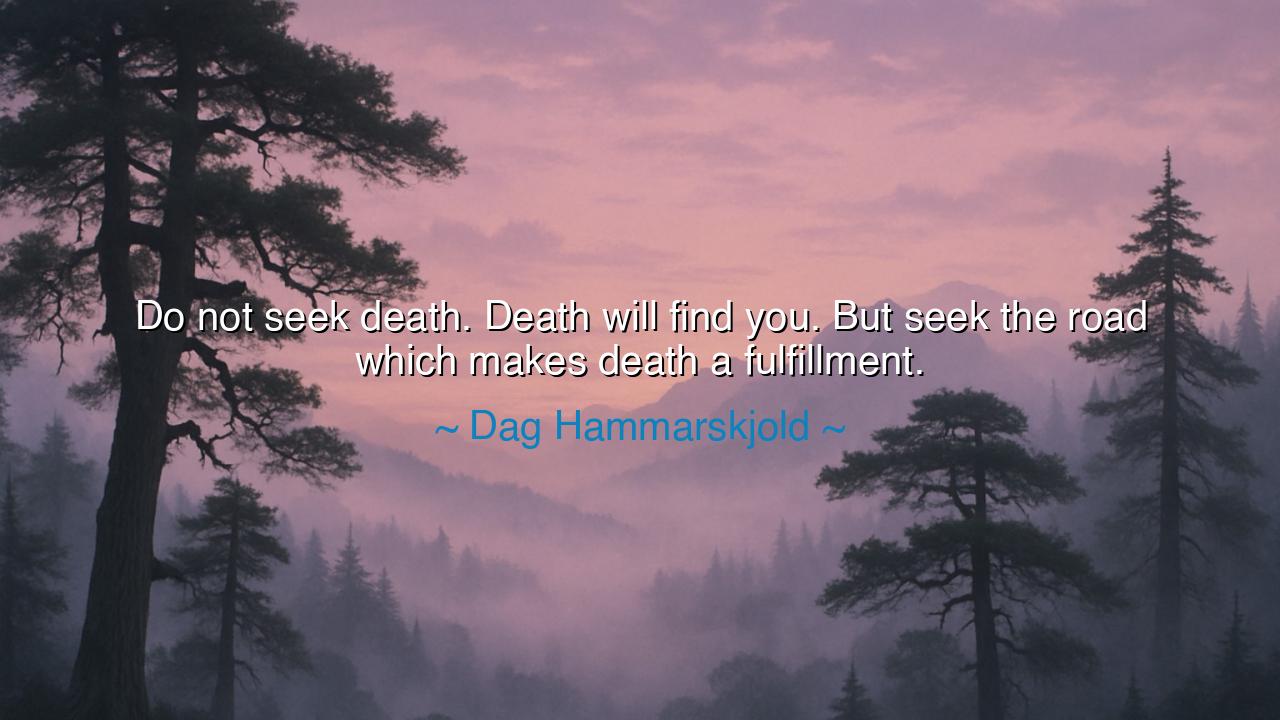
Do not seek death. Death will find you. But seek the road which
Do not seek death. Death will find you. But seek the road which makes death a fulfillment.






“Do not seek death. Death will find you. But seek the road which makes death a fulfillment.” Thus spoke Dag Hammarskjöld, the Swedish diplomat, poet, and peacemaker—a man who walked between the fire of politics and the silence of the soul. In these words lies the wisdom of one who understood the fragility of life and the nobility of purpose. He did not speak as one who feared death, nor as one who glorified it, but as one who saw it as the natural harvest of a life rightly lived. For death is not the enemy—it is the mirror that reveals whether we have lived in vain or with meaning.
Hammarskjöld himself lived this truth. As the Secretary-General of the United Nations, he bore the weight of a world still trembling from war. He sought peace where others saw only division, and he labored not for glory but for duty. In 1961, while flying on a mission to broker peace in the Congo, his plane crashed, and he perished in the wilderness. Yet in his passing, there was no tragedy of futility. His life had been a flame kindled for others, and his death—the inevitable end that finds every soul—was made a fulfillment of that service. His own words became his epitaph: he had sought the road, and walked it until the end.
The ancients knew this path well. The Stoics of old, like Marcus Aurelius, taught that one must never flee death, for it is as natural as birth. But neither must one call it early, for to do so is to abandon the sacred work of living. The wise do not seek the grave; they seek meaning so deep and pure that when death arrives, it comes not as a thief, but as a companion. The road Hammarskjöld speaks of is the path of purpose, where each step, each breath, each act of kindness builds a bridge toward completion. To walk that road is to transform existence into offering, and mortality into art.
Consider also the story of Joan of Arc, the young shepherdess who heard voices of heaven and took up arms to free her people. She did not seek death, though she knew it followed close behind her every victory. When the flames rose around her in Rouen, she did not cry for rescue but looked upward, saying, “Hold the cross high, so I may see it through the fire.” In that moment, her death became not defeat but fulfillment—the final act in a life ablaze with faith. Like Hammarskjöld, she walked her road with unwavering courage, and in the end, death found her ready.
To seek the road of fulfillment is not to live recklessly nor to hide in fear—it is to live intentionally. It is to rise each day and ask: What work is mine to do before the dusk? It is to labor not for the praise of men, but for the quiet joy of right action. The one who lives thus will not tremble when the final hour strikes, for they will know they have spent their breath in the service of something greater than themselves. Death will come, but it will come to a soul already whole.
And yet, many in this age seek escape—through despair, through apathy, through indulgence. They fear pain, so they avoid living fully. But Hammarskjöld reminds us: death will find you, whether you run or stand still. So why not live in such a way that when it does, it finds you not hiding, but creating, loving, serving? The river of life flows swiftly; the wise do not dam it, but dive into its current with open eyes and strong hearts.
Therefore, my child, remember this: Do not seek death, for that is not your task. Your task is to seek the road—the road that calls you to courage, compassion, and truth. Walk it with honor. Let your days be offerings, your words seeds of peace, your deeds echoes of love. Then, when death at last lays its hand upon your shoulder, you will not tremble. You will smile, for you will know that you have lived your purpose, and that in dying, you are simply completing the song you began long ago.






AAdministratorAdministrator
Welcome, honored guests. Please leave a comment, we will respond soon